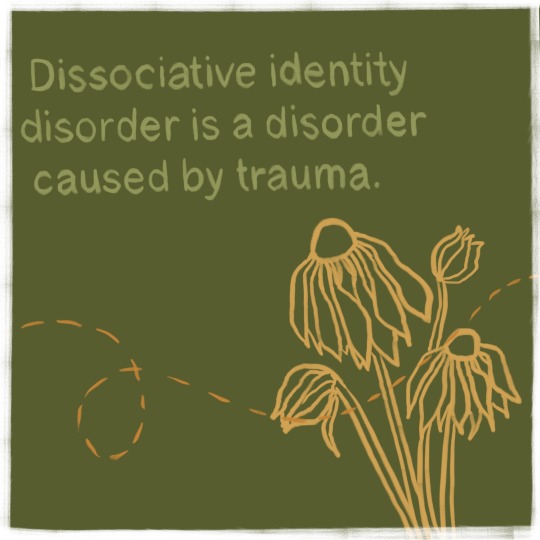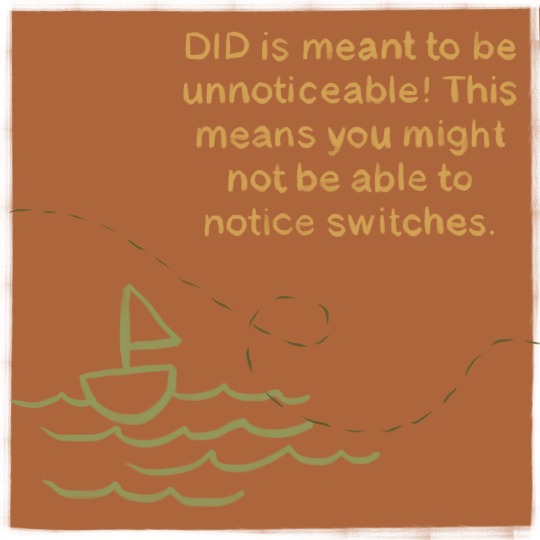Text
“If you get a new alter, is that a System update?”
My Best Friend
1K notes
·
View notes
Text
Just because you “function” doesn’t mean you don’t deserve help.
37K notes
·
View notes
Text
I was blanking on a word to describe “nostalgia but with negative feelings attached” so I googled “negative nostalgia” and it responded: “trauma.”

156 notes
·
View notes
Text
Before I knew that I had DID (or after I knew but while I was in denial about it) I used to be confused about why I would re-read things that “I” had written.
“Why am I constantly re-reading my own reddit/tumblr/facebook posts?”
“Why do I read my own writing and feel surprised or impressed by the quality of it? That seems really narcissistic. Am I a narcissist?”
“Why do I only sort of remember writing this, but not actually fully remember the content?”
It all makes a lot more sense now.
589 notes
·
View notes
Text
Trying to Get Used to Having DID
Just some tips that I hope would be helpful to other systems.
Getting Used to Sharing The Body
Sometimes, when first learning that you are multiple, it can be very difficult, very scary. Though, know, that your headmates may be facing similar fear as your’s. They’re still alive, like you.
You’d wonder about every single thing of your alters, what they do with your body. If they’d like you, or destroy your entire life. It can be scary, knowing that you’ve been looked after by people you didn’t know were there.
Dissociation is going to be one of the strangest things most anyone experiences (with OSDD, DID) when they first start to pick up what it really feels like when other alters are interacting, while you’re dissociated (yet still co-conscious). We’re updating this post (2020 June) in a few ways to further help the community. These are several ways in how dissociation could affect you—and there isn’t any reason for you to need to be afraid; you’ve depended on dissociation throughout your own existence, it’s completely normal, and it’s natural:
When you’re Dissociated:
It may feel very hard to move; you’re nearly frozen—unless you force yourself to interact
In conversation, you may begin to stress out, then suddenly you’re struggling understanding what the other person is saying; it feels far away.
Life around you starts to feel like it doesn’t seem to, “apply,” to you anymore; you struggle enjoying activities you KNOW you usually find joy in.
You may feel like you’ve lost interest in what’s going on around you; as if it’s hard to begin to care.
Temperature could feel distant; you feel immune to the heat or the cold—because you don’t feel it completely, it’s as if it doesn’t affect you.
When Headmates Interact:
You’re feeling like you’ve dissociated, yet you could feel confused in why the body seems to be doing things that you wouldn’t normally do, maybe even enjoying foods that you normally wouldn’t like, or interacting with people that you don’t care about.
A sentence slips from your mouth that you didn’t think about mentioning
When someone asks you a question, you hear multiple replies and you may feel confused on what you should actually say.
Sometimes you feel like you’re lying when you know 100% that you’ve been honest; your alters in this case don’t carry the memory that you’ve brought up in conversation—and in this case, those alters could feel the very same confusion as you’re experiencing—they don’t understand why they seemed to have said something about a topic that they’ve never touched.
Maybe you’re terrified of bugs, yet a bug crawled next to you, and you’re confused on why you felt no fear.
You may feel like you just suddenly broke down in tears and yet, you can’t figure out why you have; unsure to what just made you feel so sad.
You may feel very strongly about doing something, but you know you don’t really want to stop what you’re doing for it, yet the thoughts—the urge still persists. (Example: You just wake up from a restless night of sleep—you’re still tired, wanting to just sleep in a little more. Then an urge to get up to start your day hits you, like it’s determined to stand up out of bed. That’s you and your alter resisting each other—in this case, you could start to get a headache.)
After first getting used to your diagnosis:
• When you find information, give yourself some time to process it.
• You don’t need to know everything immediately, though do research a little bit here and there, it can be helpful.
• Denial is a natural occurance, especially with DID or OSDD
• Your headmates have known you before you known them, they’re not different as you now know they exist. You somewhat know what to expect in day-to-day life in general, you’re just as safe.
• Start researching into grounding techniques, when dissociation hits, and you become aware you’re near switching, you could go into a panic. That’s okay. A way to help, is using grounding techniques.
• Start using objects as a way to try to connect yourself with the world, to help deal with the anxiety.
• Don’t worry about telling anyone yet, don’t stress on it, give yourself time. Maybe share it with someone you know you can trust, so they could support you when you have moments you struggle to do it by yourself.
• You are not going to disappear.
• It will be okay. You will figure it out slowly, and with that, comes with settling anxieties.
• Take your own time, at your own pace.
• You don’t have to please anyone.
• There’s no wrong way of struggling with DID.
Handling Denial
Denial is a very common thing with DID or OSDD. The disorder itself rejects unpleasant memories, then to accept the disorder, is to accept these things has happened. This is the opposite of what the disorder pushes for, so naturally, denial comes around even with hard evidence.
• Write notes to yourself for when denial hits, detailing evidence you value towards your disorder. Something that you’d find some comfort it, rather than fear.
• When denial starts to linger in the mind, just shove it away. You know what you have, and you’re determined to learn how to help you, to help your headmates. (Keeping in mind why denial rises is helpful)
• If it is based that your system is abnormal compared to the majority, know that all systems are different. Some systems have alters that follow the basic roles, other systems have alters that follow rules that can’t be described in labels. Some alters can provide fake memories to cover up time loss, blacking out.
• In the end, believe in yourself. Your emotions are usually what rejects the diagnosis. You would often just feel you may not have it, but know that’s just your brain’s coping mechanism on handling the past. Believe your thoughts. If you can hear your headmates, put some belief into them.
• Naming your system could help with some denial, it could help solidify the reality of your disorder and thus allow you to feel slightly more accepting of it. A system name, is just a name that addresses everyone
One of the major barriers in communication is the distrust alters often hold within their system (as it was in our case); when you learn that it is OK to trust your system when you’ve blacked out, or when they’re fronting in general—communication could open between you and your system; your alters have been there most of your life and to protect the psyche of the mind you all share—everyone has a purpose for existing in your head space, including those alters who might scare you. Everyone has their reasons for doing what they act on.
I believe in you.
Anxiety with System Communication
Often, there is an anxiety to try to contact headmates. You’re unsure on varying things. Maybe they won’t respond, or maybe the fact their handwriting is different would send up the panic. It’s okay.
• Be yourself
• Be honest, true in nature
• You can take other people’s advice, but don’t follow exact phrases they say hoping your headmates would be more likely to respond.
• You can wait before you start to communicate, remember, give yourself time with little bits of information.
_____
Communication ideas:
- leaving notes in obvious places
- starting to journal with the system
- taking some time daily in a dark, quiet place to try to reach out to headmates
- make a system map (relationships headmates have, strongest, weakest, oldest, newest, etc)
- leave out materials for younger headmates (Littles) so they are able to draw if they’d like to. This could help with some boundaries within the system.
Put yourself first, your safety and their safety is important. As a host, you have a purpose. Believe in yourself, I’m sure your headmates believe in you.
With love,
Vessare Osud System
2K notes
·
View notes
Text
TW - what it’s like to live with DID
Most people out there have no idea how hard it is…
to ask yourself permanently who you are
not to know how to survive the day
to lose time and forget things all day
to struggle with alters who want to die or hurt the body
to struggle with alters who want to go back to the abusers because everything is better than being alone
to be overwhelmed by emotions like anger, sadness, anxiety
to be afraid of getting into a state of dissociation in public situations, being petrified, not able to move or talk
not to be able to trust anyone because everyone you trusted has abandoned you or abused you
1K notes
·
View notes
Text










To finish off DID awareness day here are some facts we have posted already and some we haven’t!
4K notes
·
View notes
Text
a lot of yall out here be disabled without even knowing it because your only view of disabled people is marred with internalized ableism.
you can’t wash/cloth/feed yourself because of overwhelming ptsd/mental conditions/ect.?
you’re disabled.
you can’t function in your day to day life because of a lack of resources for your chronic medical condition?
you’re disabled.
if you can’t navigate the world without first having to accommodate for your own body and mind because the world doesn’t have the proper accommodations for you then that is a disability.
and you have more in common with the people you think are “really disabled” than you realize regardless of your able body status.
15K notes
·
View notes
Text
So, our therapist believes that we exist and that I (Kris) have DID.
He's still trying to figure out if I have DID or OSDD (he calls it DDNOS), but I'm SO thankful that he's here for us 💖
-Kris
21 notes
·
View notes
Text
Having DID/OSDD is really like:
Me: Hey, here’s an experience that proves the existence of our system!
Also me: Okay..I’ll believe you this time, but I’m still suspicious... >_>
190 notes
·
View notes









